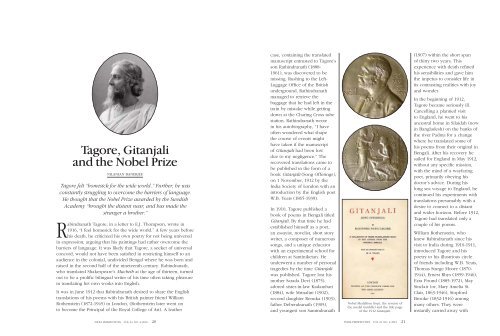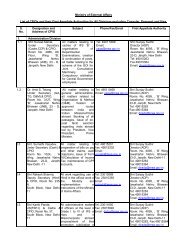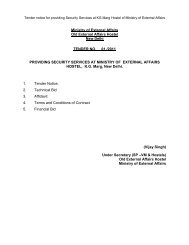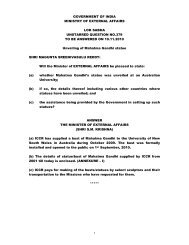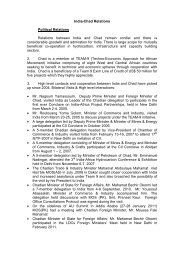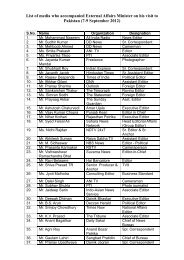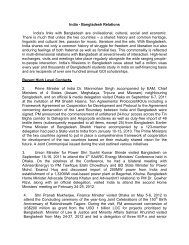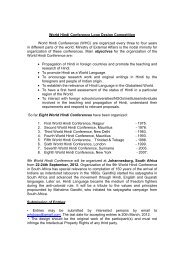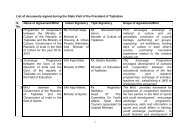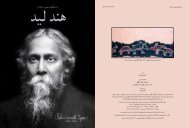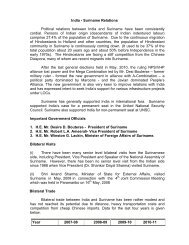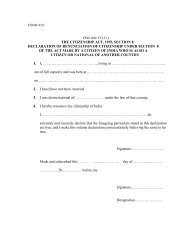IP_ Tagore Issue - Final.indd - high commission of india mauritius
IP_ Tagore Issue - Final.indd - high commission of india mauritius
IP_ Tagore Issue - Final.indd - high commission of india mauritius
You also want an ePaper? Increase the reach of your titles
YUMPU automatically turns print PDFs into web optimized ePapers that Google loves.
<strong>Tagore</strong>, Gitanjaliand the Nobel PrizeNILANJAN BANERJEE<strong>Tagore</strong> felt “homesick for the wide world.” Further, he wasconstantly struggling to overcome the barriers <strong>of</strong> language.He thought that the Nobel Prize awarded by the SwedishAcademy “brought the distant near, and has made thestranger a brother.”Rabindranath <strong>Tagore</strong>, in a letter to E.J. Thompson, wrote in1916, “I feel homesick for the wide world.” A few years beforehis death, he criticized his own poetry for not being universalin expression, arguing that his paintings had rather overcome thebarriers <strong>of</strong> language. It was likely that <strong>Tagore</strong>, a seeker <strong>of</strong> universalconcord, would not have been satisfied in restricting himself to anaudience in the colonial, undivided Bengal where he was born andraised in the second half <strong>of</strong> the nineteenth century. Rabindranath,who translated Shakespeare’s Macbeth at the age <strong>of</strong> thirteen, turnedout to be a prolific bilingual writer <strong>of</strong> his time <strong>of</strong>ten taking pleasurein translating his own works into English.It was in June 1912 that Rabindranath desired to share the Englishtranslations <strong>of</strong> his poems with his British painter friend WilliamRothenstein (1872-1945) in London, (Rothenstein later went onto become the Principal <strong>of</strong> the Royal College <strong>of</strong> Art). A leathercase, containing the translatedmanuscript entrusted to <strong>Tagore</strong>’sson Rathindranath (1888-1961), was discovered to bemissing. Rushing to the Left-Luggage Office <strong>of</strong> the Britishunderground, Rathindranathmanaged to retrieve thebaggage that he had left in thetrain by mistake while gettingdown at the Charing Cross tubestation. Rathindranath wrotein his autobiography, “I have<strong>of</strong>ten wondered what shapethe course <strong>of</strong> events mighthave taken if the manuscript<strong>of</strong> Gitanjali had been lostdue to my negligence.” Therecovered translations came tobe published in the form <strong>of</strong> abook Gitanjali (Song Offerings),on 1 November, 1912 by theIndia Society <strong>of</strong> London with anintroduction by the English poetW.B. Yeats (1865-1939).In 1910, <strong>Tagore</strong> published abook <strong>of</strong> poems in Bengali titledGitanjali. By that time he hadestablished himself as a poet,an essayist, novelist, short storywriter, a composer <strong>of</strong> numeroussongs, and a unique educatorwith an experimental school forchildren at Santiniketan. Heunderwent a number <strong>of</strong> personaltragedies by the time Gitanjaliwas published. <strong>Tagore</strong> lost hismother Sarada Devi (1875),adored sister-in-law Kadambari(1884), wife Mrinalini (1902),second daughter Renuka (1903),father Debendranath (1905),and youngest son SamindranathNobel Medallion (top), the reverse <strong>of</strong>the medal (middle) and the title page<strong>of</strong> the 1912 Gitanjali.(1907) within the short span<strong>of</strong> thirty two years. Thisexperience with death refinedhis sensibilities and gave himthe impetus to consider life inits contrasting realities with joyand wonder.In the beginning <strong>of</strong> 1912,<strong>Tagore</strong> became seriously ill.Cancelling a planned visitto England, he went to hisancestral home in Silaidah (nowin Bangladesh) on the banks <strong>of</strong>the river Padma for a changewhere he translated some <strong>of</strong>his poems from their original inBengali. After his recovery hesailed for England in May 1912,without any specific mission,with the mind <strong>of</strong> a wayfaringpoet, primarily obeying hisdoctor’s advice. During hislong sea voyage to England, hecontinued his experiments withtranslations presumably with adesire to connect to a distantand wider horizon. Before 1912,<strong>Tagore</strong> had translated only acouple <strong>of</strong> his poems.William Rothenstein, whoknew Rabindranath since hisvisit to India during 1910-1911,introduced <strong>Tagore</strong> and hispoetry to his illustrious circle<strong>of</strong> friends including W.B. Yeats,Thomas Sturge Moore (1870-1944), Ernest Rhys (1859-1946),Ezra Pound (1885-1972), MaySinclair (or, Mary Amelia St.Clair, 1863-1946), StopfordBrooke (1832-1916) amongmany others. They wereinstantly carried away withINDIA PERSPECTIVES VOL 24 NO. 2/2010 20 INDIA PERSPECTIVES VOL 24 NO. 2/2010 21


